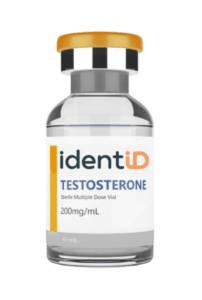 Testosterone
Testosterone
Testosterone is the main sex hormone found in males, contributing to male growth and development. As most men age, testosterone levels continue to decline and can wreak havoc on many areas of your quality of life. Most men need supplementation and don’t even realize it. General care providers may think you are “normal” in the lower 200-300 ng/dl testosterone levels and ignore treating it but with IdentID, we know that keeping you in the optimal range of 800-900, you WILL notice the difference.
Many men take testosterone replacement therapy (TRT) to replenish their testosterone levels in the body. Testosterone is available in several forms, including gels, creams, and injections. Once it enters your body it will react on several different organ systems in your body to help boost energy, increase muscle mass, enhance sexual function, increase alertness, and maintain mental sharpness (1).
The dose of testosterone is highly variable and dependent on the type of testosterone you receive. There are several types of testosterone available (e.g., cypionate, enanthate, etc.) available in different dosage forms (e.g., creams, gels, patches, and injections) (1). Your provider should determine the best type of testosterone for you as well as what dose to use. This is a static process and different individuals respond to different dosages. The key is to follow up with your blood work to make sure what ever dose and/or dosing schedule we provide you with will keep you in that sweet spot of 800-900 ng/dl.
Commonly experienced side effects with testosterone include:
- Acne
- Breast tenderness and swelling
- Breathing disruptions during sleep
- Ankle swelling
While the above effects are more short-term, there are additional long-term adverse events that can happen. Prolonged testosterone therapy can theoretically increase your risk of cardiovascular events such as heart disease and stroke when in prolonged states of supra-therapeutic ranges (Above 1200 ng/dl), but further evidence shows that maintaining your testosterone levels within the 800-900 ng/dl range can actually DECREASE all causes of mortality.
Though the safety of testosterone therapy is not fully elucidated, it is important to be mindful of these potential risks when making the decision whether to initiate therapy (1).
Certain individuals should not take testosterone. Some contraindications include:
- An allergy to testosterone
- Men with breast cancer
- Men with prostate cancer
- Pregnant women
- Individuals with serious cardiac, kidney, or liver disease (2)
